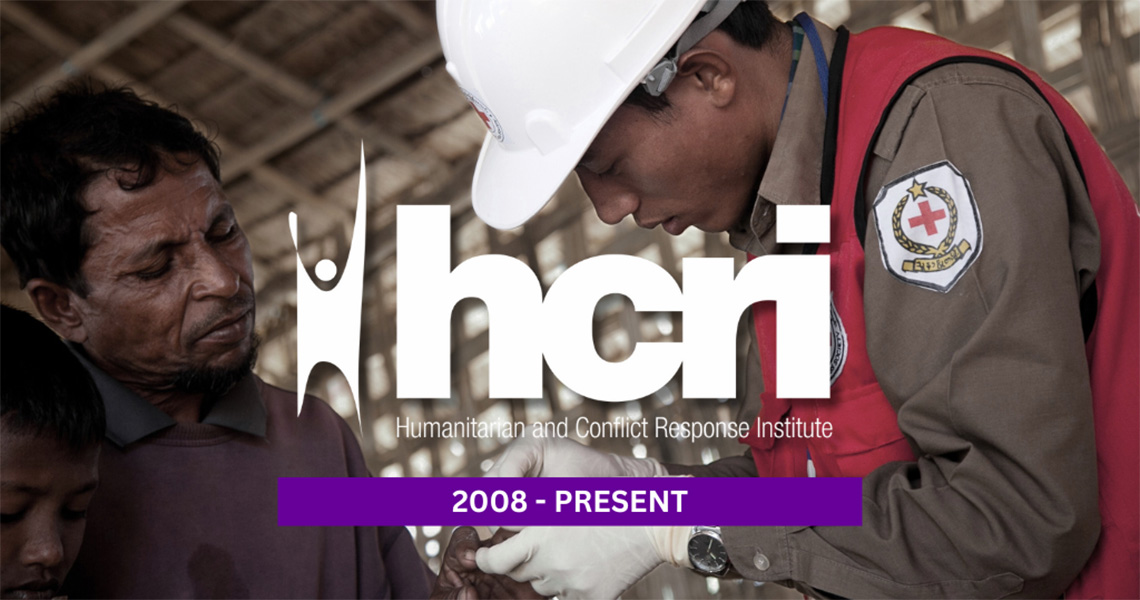
Celebrating humanitarian research, teaching and learning
The Humanitarian and Conflict Response Institute (HCRI) was founded in 2008 by colleagues across disciplines such as history, medicine, development studies and drama.
Under the iconic leadership of Dr Rony Brauman (President of Médecins sans Frontièrs (MSF) from 1982 to 1994), Prof Peter Gatrell, Prof Tim Jacoby, Dr Tanja Müller, Emeritus Prof Tony Redmond, Prof Bertrand Taithe and Prof James Thompson originally established HCRI as an interdisciplinary research institute.
Since then, HCRI has responded to international demand for research-informed teaching in humanitarian studies by developing a range of postgraduate and undergraduate programmes.
"HCRI's interdisciplinary nature provided great scope to match my interest in the cultures and histories of humanitarianism and modes of solidarity with hands-on issues emerging from humanitarian practice, particularly those relating to medicine."
Dr Tanja Müller / Co-founder of HCRI and now Professor of Political Sociology at GDI
From its original four students in 2009-10, HCRI has grown to become one of the most significant institutions for humanitarian teaching and research in the UK, and worldwide.
Worldwide collaborations
Together with UK-Med, a non-governmental organisation that develops and deploys volunteer clinicians and allied health professionals to support international emergency medical response, HCRI has responded to disasters and epidemics across the world.
This collaborative partnership has helped the institute to contribute to a novel configuration for research and teaching. It brings together practitioners, non-governmental organisation (NGO) partners, theoreticians, policymakers, and analysts in sustained intellectual engagement. In 2016, HCRI became a collaborating centre of the World Health Organisation (WHO).
HCRI also has longstanding collaborations with humanitarian organisations including Save the Children, International Federation of Red Cross Red Crescent Societies (IFRC), Mines Advisory Group (MAG), Tata Institute of Social Sciences, and Project Trust.
More recently, HCRI has a Memorandum of Understanding with Liverpool School of Tropical Medicine and Médecins Sans Frontières (MSF), forming a unique partnership to deliver an educational programme that will teach the leading humanitarians of tomorrow.
"What stands out for me since joining HCRI is the unique opportunity it has given me to work with a huge range of professionals from a really wide range of disciplines, including medical humanities, anthropology, history and development studies, as well as the opportunity to develop close relationships with humanitarian and development organisations from the local to international level."
Dr Darren Walter / Programme Director of Online Programmes and Senior Lecturer in Emergency Global Health
A decade and half of HCRI
Explore HCRI's rich history over the years through our interactive timeline.
Research
Our novel research configuration combines the expert insights of leading researchers in both applied medicine and humanities, in partnership with non-governmental organisations and other collaborators.
Research
See the impact our research has had over the last decade.
Read more
Current projects
View our current research projects.
Read more
"The richest part of being involved in research at HCRI is the opportunity to consider questions from so many different angles, as colleagues have such wide interests and varied disciplinary backgrounds. Being surrounded by such vibrant and interesting researchers (especially as a clinician) challenges the notion of a competitive academic environment into a feeling that we are all much stronger when we collaborate and learn from one another."
Anisa Jafar / NIHR Academic Clinical Lecturer
Events
HCRI hold a range of events throughout the academic year that celebrate humanitarian research and importantly looks towards the future of humanitarianism. You can see a full list of upcoming and past events at HCRI on our events page.
Learn more
Find out more about HCRI and our people, and stay up to date with the latest news from the institute.
